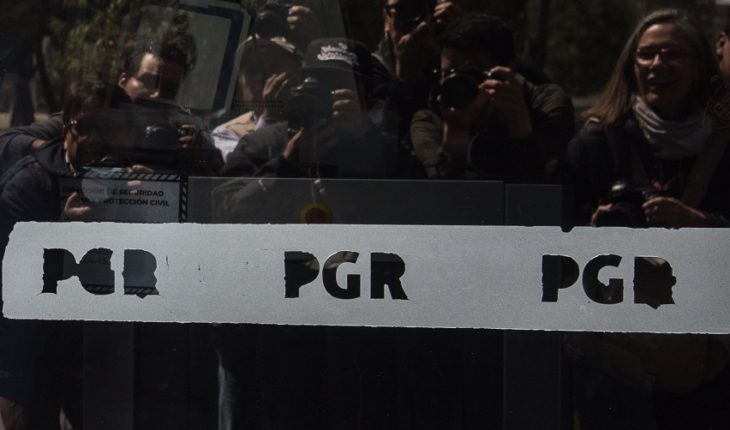the backlog of cases in the Attorney General’s Office (now Prosecutor General) is a problem far from solved compounded. In 2017 the judges returned more 60% pending inquiries that appropriated them, one rate four times greater than the registered three years ago. This rhythm, to 2027, still there will be 16 thousand preliminary investigations behind and no response.
they are joined cases of the new criminal justice system. 123 thousand initiated research portfolios of the PGR resolved less than 0.6% by alternative mechanisms of Justice, key tool for. depressurise the criminal justice system. Instead he sent judges more than 30 thousand cases while in 80 thousand investigations determined that it did not have elements to proceed.
Thus pointed out reports of results of performance audits carried out by the Superior audit Federation (ASF), which concluded that the Prosecutor’s Office is an institution that works by “inertia”, ordering acts of investigation and writing and prosecuting cases, but whose backwardness, coupled with the lack of indicators of efficiency in the quality of research, call into question their contribution to a real enforcement.
“(La Fiscalía no acredita) measurement parameters for the efficient performance of the MP in the conduct and coordination of research, or to assess in what measure helps the law enforcement effective and efficient in detriment to social cohesion and” a lack of confidence of citizens in the performance of the institutions of the State”, indicated the Auditors.
In December passed the current Prosecutor General Alejandro Gertz Manero had alerted – the contender for the post – that one of the main problems facing the institution is the backlog of more than 200 thousand cases, some of which date back several decades.
In this context on Friday March 1 was published in the official journal of the Federation the agreement of the Prosecutor which created the unit of transition of the Prosecutor General, which among others will have the Mission of assessing the level of backlog of cases that are inherited from the PGR , and define a strategy to meet them and let steam them.
old system: I delay and inefficiency
the ASF, as part of its final report of the 2017 public account, presented two audits of performance on the PGR: one that evaluates its work on the preliminary investigations open before 2016 with the old criminal justice system, and the other on research folders with the new accusatory penal system.
As for the old penal system, data show that the PGR revised 97 thousand 436 findings, of which only allocated before a judge 1 thousand 408, amounting to 1.5%. This falls below the institutional goal which was recorded, at least 4% of the total number of inquiries which are reviewed annually. Also just a few of the thousand 1 408 appropriations were made with a detainee.
The Auditors noted that even though the average of revised preliminary investigations may be increased annually, there is a clear drop in the percentage of inquiries that are annually set out with or without the detainee.
“With available data from the 2015-2017 period, the ASF an analysis which was projected to continue the trend in 2027, the PGR will still have 16.3% (16 thousand 253) of the 99 thousand 463 preliminary investigations pending”, the report said.
In this context, the ASF said that it “requires mechanisms to ensure the conclusion of the preliminary investigations and thereby reduce its backlog and thus, to finalize the activities within the framework of the inquisitorial system of criminal justice, to focus them only to the new Adversarial criminal justice system”.
Added to this is one even greater problem: inefficiency. Auditors found that the 1 mil 408 preliminary investigations in 2017 there were 873, amounting to 62% of the total, that were returned by the judges due to inefficiencies in the investigation of crimes and the construction of the case.
It’s a level of ineffectiveness in investigations which, over a period of three years, practically has quadrupled, from 15.9% of appropriations returned in 2015, up to 62% of appropriations returned in 2018.
In a meeting with the Auditors to address this issue, the PGR officials pointed out that they had identified the main causes by which the judges returned the appropriations. Among them were the lack of accreditation right in the body of the crime, of failures in the formalities of Assembly of the record, or deficiencies in the investigation.
Despite this recognition the ASF stresses that the now prosecution “not credited the implementation of strategies to address and solve these deficiencies, and in order to decrease the number of contained preliminary investigations returned by the judge”.
new system: starting with
doubts as regards the work of the Prosecutor’s Office in the new penal system, the audit report points out that in 2017 123 thousand discussed 302 portfolios of research (both open this year from the year previous). Of that total is judicializaron 14 thousand 353 folders before a judge, amounting to 15.2% of the total, after which prosecutors considered that in such cases there were elements to proceed criminally against likely responsible.
However the Auditors highlighted that just 482 initiated research portfolios were resolved through alternative mechanisms for resolving disputes, amounting to 0.6% of the total. This falls well below the annual goal raised, resolved by alternative mechanisms that help Depressurize the system, at least the 5.3% of research folders.
Another important weakness that the Auditors highlight in this topic is that total of 482 folders solved by alternative mechanisms, the PGR not credited the type of mechanism that solves the case, either by mediation, conciliation or Board restorative, which in turn prevents really know if at least in those few cases there was adequate reparation of the damage for the benefit of the victim.
“In terms of the new criminal justice system the PGR is unknown its contribution to the law enforcement effectively and efficiently, through the persecution and prosecution of the crimes of the federal order (…)” “did not promote the use of alternative mechanisms for dispute resolution, essential component of the new system, in terms of the repair of damages to the complainant, and ignored the advance of the professionalization of the personal noun”, said the ASF.
Auditors also highlighted that if well the PGR reported the training of 2 thousand 609 public servants in the new penal system, is impossible to know if such courses contributed to an effective professionalization, as it lacks a measurement parameter for assess the impact of the courses.
attempting to justice? Challenges in the transition
in 2017 the PGR culminated 96 thousand 915 shares research from 125 thousand 273 who were pending, exceeding the proposed target. Also made 302 thousand 899 expert interventions falling just 0.6% under the proposed annual goal. In both cases you can tell that it had complied with its work.
However, the Auditors noted that even though the PGR had complied with these functions which is obliged, lacked specific indicators that evaluate to what degree this work of police officers and experts allows the agents of the Public Ministry build cases with better odds of success and thereby ensure justice.
“Even though the Attorney reached the goals established in respect of acts of investigation of police and experts, it did not have a parameter of measurement that would allow the efficient performance of the MP in the conduct and coordination of research (…) so that it operated in inertial way”, concluded Auditors.
The abatement of these levels of impunity and backwardness in the portfolios of research and preliminary investigations are some of the goals that the current Prosecutor General, Alejandro Gertz Manero, raised last December when he competed on the charge that currently occupies.
During his hearing, Gertz warned that the unit had a backlog of more than 200 thousand cases, some of which date back more than two decades. To add 22 thousand orders of apprehension and court injunctions that have not been met.
Last Friday was published in the official journal of the Federation (DOF) the agreement A/004/19 which created the unity of transition of the General’s Attorney, unit responsible for drawing up the scheme of transition of the area sy Affairs of the PGR – who Constitution onalmente ceased to exist in December – to the General Prosecutor’s Office of autonomous.
Among the functions of that unit will be designing a procedure or strategy for the transmission of all the cases that are pending. All this within a maximum period of one year.
Thanks for reading! Help us to continue with our work. How? You can now subscribe to political Animal on Facebook. With your monthly donation, you will receive special content. Find out how to subscribe here. Check our list of frequently asked questions here.
translated from Spanish: Judges returned for 60% of the appropriations of PGR failure
March 5, 2019 |





